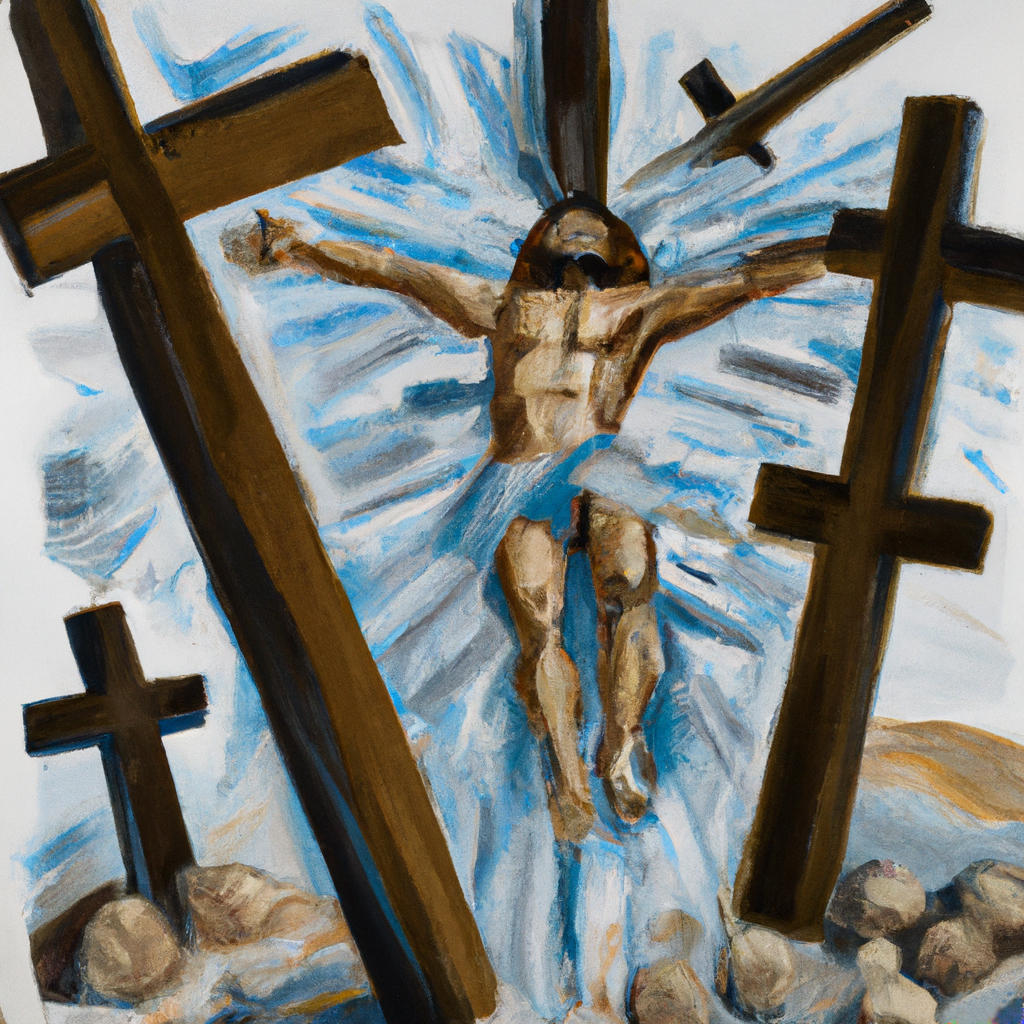Christian Art | Jesus And The Holy Spirit At Pentecost
Office Of Readings | Eastertide Week 7, Tuesday | A Reading From The Treatise Of Saint Basil The Great On The Holy Spirit | The Power Of The Holy Spirit Fills The Whole Universe
‘The power of the Holy Spirit fills the whole universe.’
Saint Basil the Great’s Treatise on the Holy Spirit was written during a time of doctrinal instability when the Church faced serious challenges regarding the nature and divinity of the Holy Spirit. Basil’s work is both an affirmation of the Spirit’s divine identity and a profound meditation on the Spirit’s activity in creation, revelation and sanctification.
The Holy Spirit’s Divine Identity And Titles
Basil opens by calling our attention to the Spirit’s many titles: ‘the Spirit of God’, ‘the Spirit of truth’, ‘the steadfast Spirit’, ‘the guiding Spirit’. These names not only describe the Spirit’s functions but also reveal his divine essence. Most tellingly, Basil emphasises that the Spirit’s proper name is ‘Holy Spirit’, setting him apart as uniquely divine. In the context of fourth-century theological debate — especially against the Pneumatomachians who denied the Spirit’s full divinity — this insistence was both polemical and devotional.
The use of these titles links directly to the New Testament witness, where the Spirit is presented not merely as a force or divine energy, but as a person — one who speaks (Acts 13:2), teaches (John 14:26) and can be grieved (Ephesians 4:30). Basil’s theology underlines that the Holy Spirit is fully God, worthy of worship and participation in the life of the Trinity.
The Holy Spirit As Giver Of Life And Sanctifier
Basil paints a compelling picture of the Spirit as the source of sanctification and life itself. Echoing the creation narrative, where the Spirit hovers over the waters (Genesis 1:2), he writes that all living things turn to the Spirit ‘according to their ability’, drawing life and purpose from his breath. This is aligned with Romans 8:11, where Paul says the Spirit who raised Jesus from the dead will give life to our mortal bodies.
The Spirit sanctifies not only by making us holy but by enabling us to participate in God’s life. Through communion with the Spirit, Christians are drawn into the divine mystery. Basil’s assertion that ‘we become God’ through the Spirit should be read through the lens of theosis, the Eastern Christian doctrine of deification. It does not mean that we become identical with God in essence, but rather that we are transformed by grace, made to participate in the divine life through the indwelling of the Spirit (cf. 2 Peter 1:4).
The Holy Spirit’s Immanence And Universality
Basil uses the striking metaphor of sunlight to describe the Spirit’s universal presence and personal indwelling. Just as the sun shines on all but is uniquely experienced by each person, so too the Spirit is present to all and yet gives himself as though personally and wholly to each believer. This is reminiscent of 1 Corinthians 12:4–11, where Paul explains that the Spirit bestows various gifts according to God’s will, but always for the common good.
This image also underscores a profound truth: the Spirit does not lose or divide himself in being shared. He gives himself fully, making each recipient a vessel of divine light, a bearer of holiness. The faithful are thus made not only holy themselves but also become channels of grace for others — a radiant chain of sanctification through the Body of Christ.
The Transforming Work Of The Holy Spirit
The Spirit does not simply accompany the believer; he transforms. Basil describes the soul illuminated by the Spirit as becoming ‘very bright’ and ‘a source of grace for others’. This interior transformation leads to spiritual fruitfulness and mission.
Indeed, through the Spirit we receive knowledge of divine mysteries, insight into Scripture, prophetic understanding and strength to persevere in holiness. Basil, like Paul, recognizes the Spirit as the one who forms us into citizens of heaven (cf. Philippians 3:20) and draws us into eternal communion with God. This is not just preparation for future glory — it is the beginning of heaven now.
Liturgical And Ecclesial Implications
St Basil’s teaching also shaped the Eastern Christian liturgy, especially the emphasis on the epiclesis, the invocation of the Spirit to sanctify the Eucharistic gifts. This reflects a deeply pneumatological understanding of Christian worship: it is the Spirit who makes the Church the Body of Christ and unites us to the Father.
His insistence on the Spirit’s divinity would later find its place in the Niceno-Constantinopolitan Creed (381), where the Spirit is confessed as ‘the Lord, the Giver of life, who proceeds from the Father, who with the Father and the Son is adored and glorified’.

A Reading From The Treatise Of Saint Basil The Great On The Holy Spirit | The Power Of The Holy Spirit Fills The Whole Universe
The titles given to the Holy Spirit must surely stir the soul of anyone who hears them, and make him realize that they speak of nothing less than the supreme Being. Is he not called the Spirit of God, the Spirit of truth who proceeds from the Father, the steadfast Spirit, the guiding Spirit? But his principal and most personal title is the Holy Spirit.
To the Spirit all creatures turn in their need for sanctification; all living things seek him according to their ability. His breath empowers each to achieve its own natural end.
The Spirit is the source of holiness, a spiritual light, and he offers his own light to every mind to help it in its search for truth. By nature the Spirit is beyond the reach of our mind, but we can know him by his goodness. The power of the Spirit fills the whole universe, but he gives himself only to those who are worthy, acting in each according to the measure of his faith.
Simple in himself, the Spirit is manifold in his mighty works. The whole of his being is present to each individual; the whole of his being is present everywhere. Though shared in by many, he remains unchanged; his self giving is no loss to himself. Like the sunshine, which permeates all the atmosphere, spreading over land and sea, and yet is enjoyed by each person as though it were for him alone, so the Spirit pours forth his grace in full measure, sufficient for all, and yet is present as though exclusively to everyone who can receive him. To all creatures that share in him he gives a delight limited only by their own nature, not by his ability to give.
The Spirit raises our hearts to heaven, guides the steps of the weak, and brings to perfection those who are making progress. He enlightens those who have been cleansed from every stain of sin and makes them spiritual by communion with himself.
As clear, transparent substances become very bright when sunlight falls on them and shine with a new radiance, so also souls in whom the Spirit, become spiritual themselves and a source of grace for others.
From the Spirit comes foreknowledge of the future, understanding of the mysteries of faith, insight into the hidden meaning of Scripture, and other special gifts. Through the Spirit we become citizens of heaven, we enter into eternal happiness, and abide in God. Through the Spirit we acquire a likeness to God; indeed, we attain what is beyond our most sublime aspirations – we become God.

Glossary Of Terms
Holy Spirit: The third Person of the Holy Trinity, described by Basil as the source of holiness, spiritual light, and divine life, active in creation and sanctification.
Spirit of God / Spirit of Truth: Titles emphasising the Holy Spirit’s divine origin and role in revealing and affirming truth.
Sanctification: The process of becoming holy, which the Holy Spirit initiates and sustains in the soul.
Communion with the Spirit: A transformative union by which the believer shares in the Spirit’s life and grace, becoming ‘spiritual’ and capable of reflecting divine light.
Spiritual light: A metaphor for the enlightenment the Spirit brings to the mind and soul, enabling knowledge of God and truth.
Self-giving: A key attribute of the Spirit, who gives himself to all without diminishing his essence or power.
Transparency / Radiance: Imagery used to describe how souls purified by the Spirit shine with divine grace, as clear glass becomes radiant in sunlight.
Foreknowledge: One of the Spirit’s gifts — the ability to perceive things yet to come, linked to prophetic insight.
Mysteries of faith: Profound truths of the Christian faith, made intelligible through the Spirit’s illumination.
Citizens of heaven: A phrase indicating the believer’s new identity and belonging in the eternal kingdom through life in the Spirit.
Likeness to God: The transformative goal of the spiritual life, whereby the believer grows in resemblance to God’s holiness and love.
Deification (theosis): The Eastern Christian concept — strongly implied by Basil — of becoming ‘godlike’ through participation in divine life, not by nature but by grace.

Prayer With Jesus | Love Revealed | The Trinity
Come, Holy Spirit, gentle Breath of God,
You who sanctify creation and dwell in our hearts,
Shine upon our souls as light shines through crystal —
Transform us into vessels of your grace.
Grant us wisdom to know your truth,
Courage to walk your ways,
And charity that overflows in service to others.
Make our lives radiant with your presence,
That we may be citizens of heaven even now,
Living temples of your glory.
Through your indwelling power,
Raise us beyond what we could ever ask or imagine,
That, with all the saints,
We may become partakers of the divine nature,
And rejoice for ever in the light of the Blessed Trinity.
Amen.








